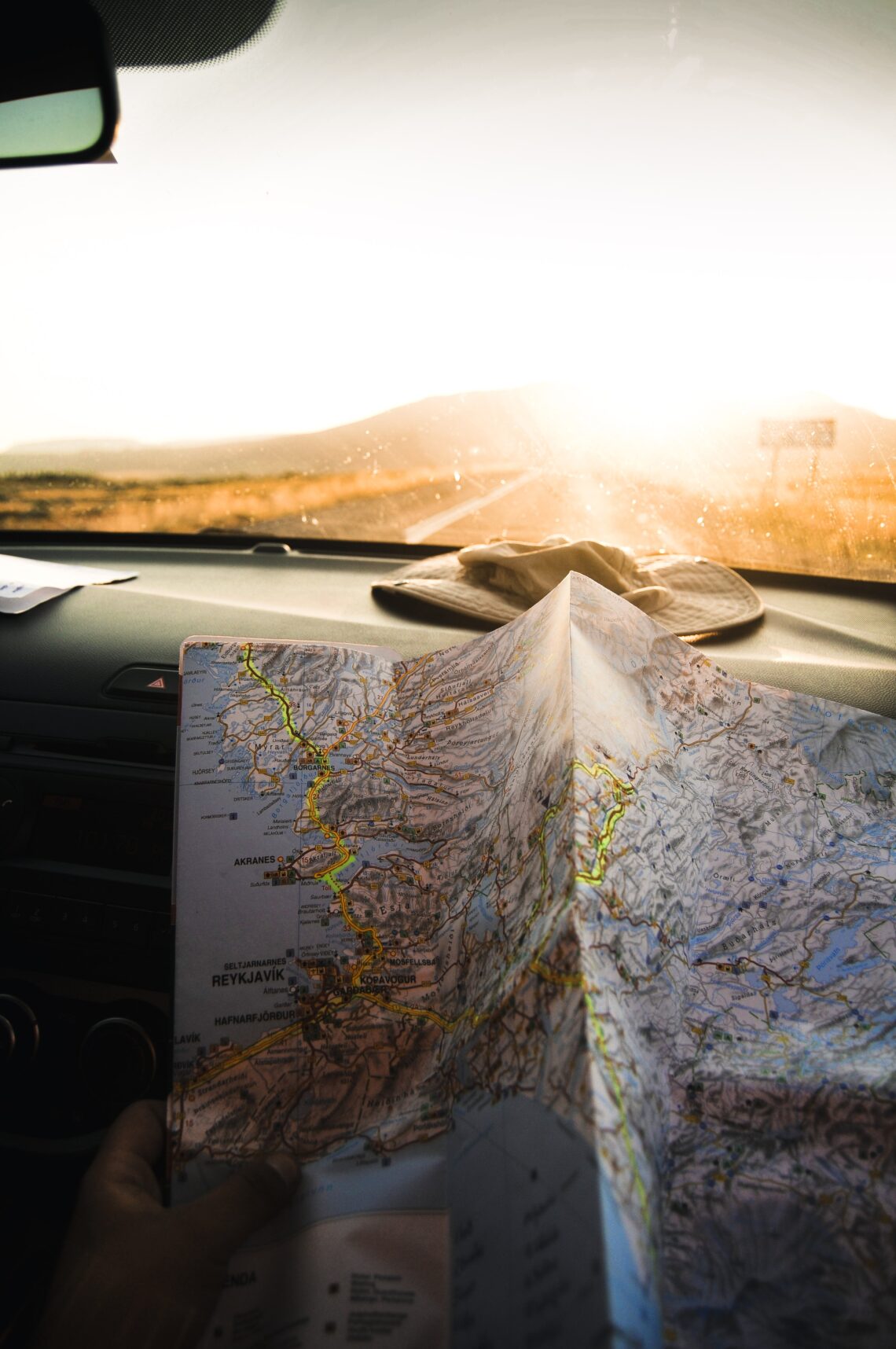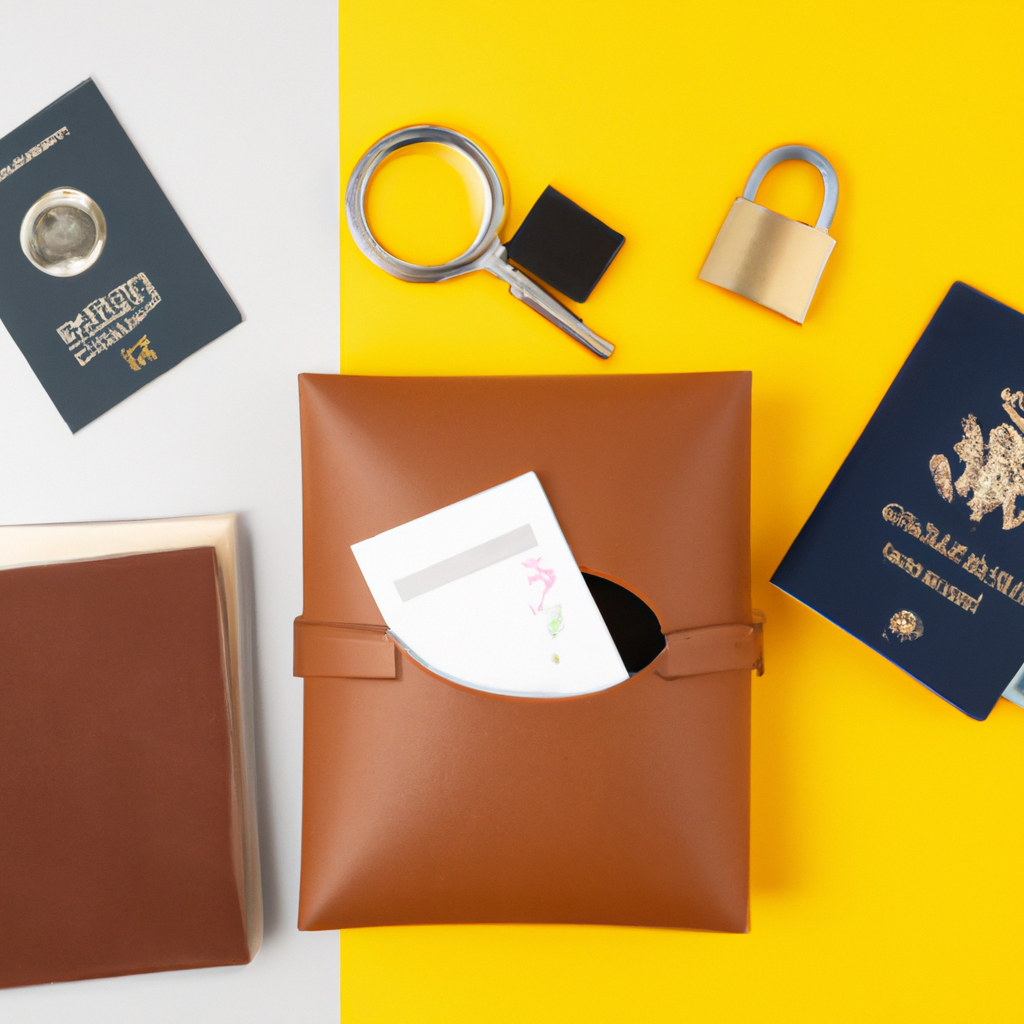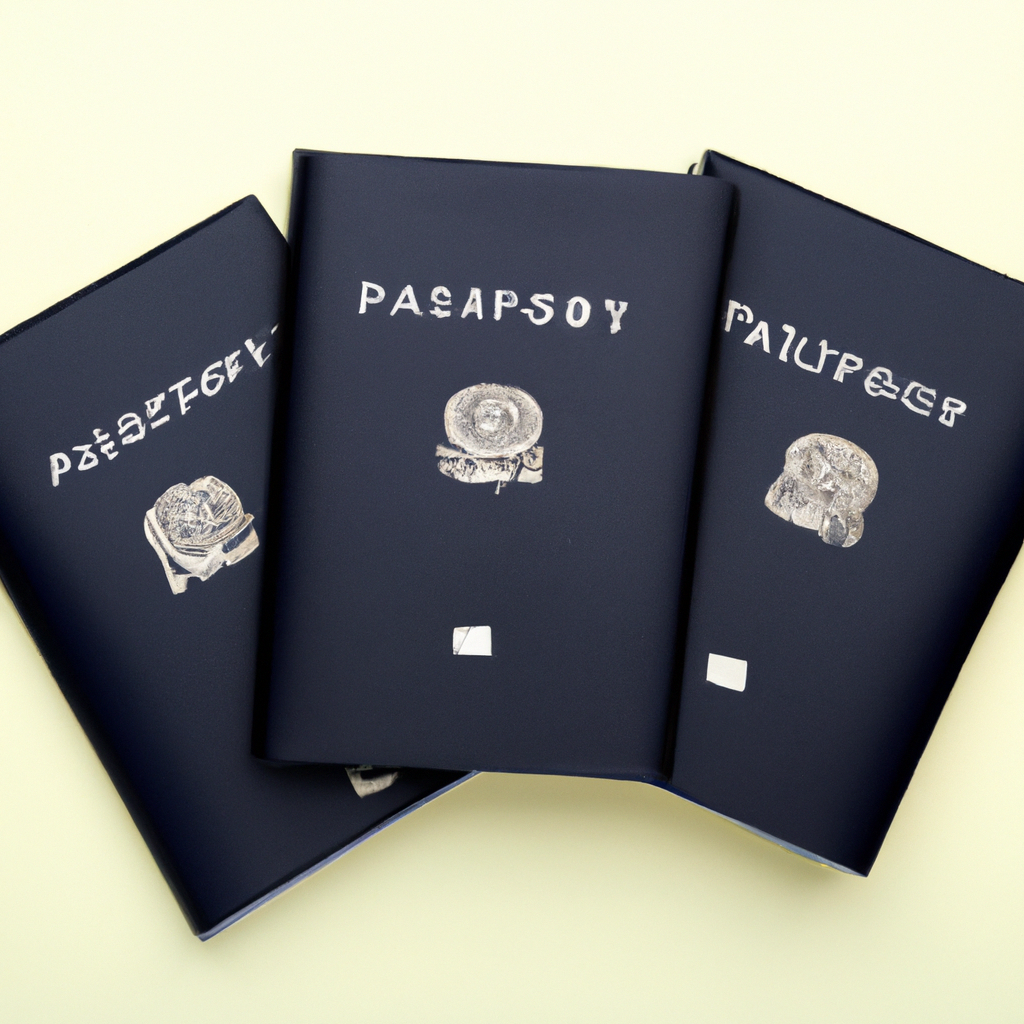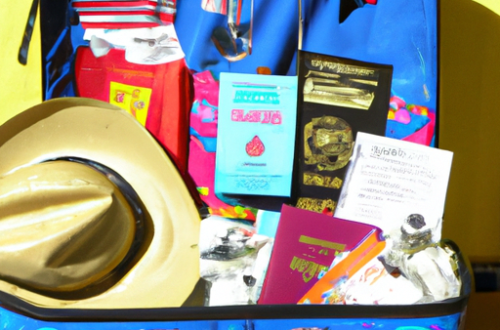
How Can I Ensure My Travel Documents And Passports Are Secure?
If you’re someone who loves to travel, the last thing you want to worry about is the security of your travel documents and passports. Losing them or having them stolen can quickly turn your dream trip into a nightmare. Fortunately, there are several simple yet effective steps you can take to ensure the safety of these crucial documents. From investing in a secure travel wallet to making digital copies and registering with your embassy, this article will provide you with all the necessary tips and tricks to keep your travel documents and passports safe and secure throughout your travels.
Choose a Secure Destination
Research the Safety of Your Destination
Before embarking on your travel adventure, it is crucial to research the safety of your chosen destination. Look for reliable sources that provide information about any travel advisories or warnings for the country you plan to visit. Pay attention to recent events and consider how they may affect the safety of tourists. By staying informed about the current situation, you can make an informed decision about whether the destination is secure enough for your travels.
Learn about Common Scams and Theft Risks
Every destination has its fair share of scams and theft risks that tourists need to be aware of. Take some time to learn about the common scams and theft techniques that are prevalent in your destination. This knowledge will help you identify and avoid potential risks during your trip. Familiarize yourself with tactics such as pickpocketing, credit card fraud, and tourist-targeted scams. By being aware of these risks, you can take preventative measures to protect your valuable travel documents.
Consider Travel Insurance
One way to ensure the security of your travel documents is to invest in travel insurance. Travel insurance typically covers a range of unexpected events such as loss or theft of personal belongings, including passports and travel documents. In the unfortunate event that your documents are lost or stolen, travel insurance can provide financial assistance for obtaining replacement documents or help you navigate the necessary procedures. When choosing a travel insurance plan, make sure to read the policy carefully to understand what is covered and any specific requirements.
Protect Your Documents
Make Copies of Important Documents
One of the most important steps in securing your travel documents is to make copies of them. Scan or photocopy your passport, driver’s license, visas, and any other important identification documents. Having digital or physical copies of these documents can be a lifesaver in case your originals are lost or stolen. Make at least two copies of each document and keep them separate from the originals, ideally in different bags or storage locations.
Store Copies in a Secure Location
Once you have made copies of your travel documents, it is essential to store them in a secure location. Consider using a travel document organizer or a waterproof pouch to keep your copies safe. These organizers often come with multiple compartments that can hold various documents securely. Additionally, hotel safes or lockers can provide a secure storage option during your travels. Remember to avoid storing documents in easily accessible places like the back pocket of your bag.
Use a Travel Document Holder
Travel document holders are a convenient and secure way to keep all your essential documents organized and easily accessible. These holders typically have dedicated slots for your passport, boarding pass, credit cards, and other travel-related documents. Look for a holder that has RFID blocking technology to protect your documents from unauthorized scanning. Using a document holder not only keeps your documents secure but also helps you stay organized throughout your trip.
Consider Using a Money Belt
A money belt is a small and discreet pouch that can be worn underneath your clothing, providing an extra layer of security for your important documents and cash. These belts are designed to be worn around the waist and can hold items such as your passport, credit cards, and cash. By keeping your valuables close to your body, you reduce the risk of theft or pickpocketing. When using a money belt, remember to keep it hidden and avoid drawing attention to it.
Keep Your Passport and Important Documents with You
While it is important to store copies of your travel documents securely, it is equally crucial to keep the original documents with you at all times during your travels. Your passport and other identification documents are essential for various activities, including checking into hotels, renting cars, and crossing international borders. Ensure that you have a secure and easily accessible place, such as a zipped pocket or a front pouch of your bag, where you can keep these documents safe. Avoid leaving them unattended or in easily accessible compartments.
Secure Your Luggage
Invest in a Reliable Luggage Lock
Securing your luggage is crucial for protecting not only your personal belongings but also your travel documents. Invest in a sturdy and reliable luggage lock that can deter theft and tampering. Look for locks that are TSA-approved, as they can be easily opened and relocked by security officials if necessary. Ensure that you use the lock to secure all the compartments of your luggage, including exterior pockets and zippers.
Use Airport Plastic Wrap Services
Many airports offer plastic wrap services that provide an additional layer of security for your luggage. These services involve tightly wrapping your suitcase in plastic film, making it more difficult for anyone to access or tamper with your belongings. The plastic wrap can also help protect your luggage from damage during rough handling. While this service may incur an additional cost, the added peace of mind is well worth it, especially when it comes to securing your travel documents.
Keep Valuables in Your Carry-On Bag
To minimize the risk of losing or having your valuables stolen, always keep them in your carry-on bag. This includes your passport, travel documents, electronics, jewelry, and any other valuable items. Carry-on bags are usually kept with you throughout the journey, preventing them from being mishandled or misplaced during baggage handling processes. By keeping your important belongings close, you have better control over their security.
Avoid Displaying Expensive Items
When traveling, it is best to avoid drawing unnecessary attention to yourself and your belongings. This includes avoiding the display of expensive items such as expensive jewelry, designer bags, or high-end electronics. Flaunting luxurious possessions can make you a target for theft or scams. It’s wise to dress modestly and blend in with the local culture to reduce the risk of attracting unwanted attention. The more inconspicuous you appear, the less likely you are to become a target for theft.
Practice Personal Safety
Be Vigilant at Airports and Train Stations
Airports and train stations are often bustling hubs filled with people from all walks of life. While it is exciting to be in such dynamic environments, it is also essential to be vigilant about your surroundings and personal belongings. Keep a close eye on your luggage at all times and ensure that you are aware of any suspicious activity. Be cautious of anyone attempting to distract or divert your attention, as this could be a ploy to steal your belongings.
Use Secure Transportation Options
When it comes to transportation during your travels, opt for secure and reputable options. Make use of licensed taxis or ride-sharing services whenever possible, as they provide a safer alternative compared to unlicensed or unofficial modes of transport. Research the transportation options available in your destination and choose those that have positive reviews and a good track record in terms of safety and security.
Avoid Sharing Sensitive Information
While it is essential to interact with locals and fellow travelers during your journey, it is crucial to exercise caution when sharing sensitive information. Avoid discussing personal details such as your full name, address, or travel plans with strangers, especially those you have only recently met. Be mindful of who you share personal information with and use discretion in revealing any sensitive details that could compromise your security or privacy.
Be Cautious of Public Wi-Fi Networks
Public Wi-Fi networks are often convenient to use, but they can also pose significant risks to your personal information and data. Avoid accessing sensitive accounts or inputting personal information, such as passwords or credit card details, when connected to public Wi-Fi networks. Hackers can easily intercept your data on such networks. If you need to connect to the internet, consider using a virtual private network (VPN) that encrypts your connection and adds an extra layer of security.
Notify Authorities about Your Travel Plans
Register with Your Country’s Embassy or Consulate
Before traveling to a foreign country, it is advisable to register with your country’s embassy or consulate. This registration provides important information about your presence in the destination country and enables authorities to contact you in case of emergencies or potential threats. Many countries offer online registration services that are quick and simple to complete. By registering, you allow your government to provide assistance and support when needed, enhancing the security of your travel documents.
Share Your Itinerary with Trusted Friends or Relatives
To ensure your safety during your travels, share your itinerary with trusted friends or relatives. Providing them with details of your travel plans, including flight information, accommodation details, and contact numbers, can help them keep track of your whereabouts. In case of any unforeseen events or emergencies, your loved ones will be better equipped to assist you or alert the relevant authorities. Regular communication with your trusted contacts can also provide a sense of security and peace of mind.
Be Prepared for Emergencies
Carry Emergency Contact Information
It is essential to carry emergency contact information with you at all times during your travels. This includes the contact details of your country’s embassy or consulate, as well as local emergency services. Having this information readily available can be invaluable in the event of an emergency, ensuring that you can quickly reach out for assistance when needed. Store these contact numbers in your phone, write them down on a card, and keep a copy in your travel documents as a backup.
Know the Location of Your National Embassy or Consulate
Before traveling, familiarize yourself with the location of your country’s embassy or consulate in your destination country. In case of emergencies or the loss of your travel documents, knowing where to go for assistance is crucial. You can find this information on the official website of your country’s foreign affairs department, or you can ask for details from your embassy or consulate before your trip. Being aware of the embassy’s location and contact information provides peace of mind and ensures you can reach out for help if needed.
Monitor Your Documents and Credit Cards
Regularly Check Your Passport and Travel Documents
Throughout your trip, make it a habit to regularly check the condition and location of your passport and other travel documents. Ensure that they are securely stored and easily accessible when needed. If you notice any signs of damage or misplacement, take immediate action to rectify the situation. Addressing any issues promptly will help you avoid last-minute complications or difficulties during your journey.
Keep an Eye on Your Credit Card Statements
While traveling, it is important to remain vigilant regarding your credit card statements. Regularly check your statements for any suspicious or unauthorized transactions. If you notice any discrepancies or fraudulent activity on your account, contact your bank or credit card provider immediately. Acting quickly can help prevent further unauthorized charges and protect your financial security while you travel.
Renew Your Passport in Advance
Check the Expiration Date of Your Passport
Before embarking on your trip, check the expiration date of your passport. Many countries require at least six months of validity remaining on your passport beyond your intended departure date. If your passport is nearing expiration, it is recommended to renew it well in advance to avoid any complications or last-minute rush. Renewing your passport early ensures that you have a valid travel document and provides peace of mind throughout your journey.
Allow Sufficient Time for Renewal
Passport renewal processes can take time, so it is crucial to allow sufficient time for the renewal before your traveling date. Check the processing times for passport renewals in your country and plan accordingly. Rushing the renewal process may lead to unnecessary stress and potential delays in receiving your new passport. By giving yourself ample time, you can complete the renewal smoothly and avoid any disruptions to your travel plans.

Report Lost or Stolen Documents Immediately
Contact Local Authorities
In the unfortunate event of lost or stolen travel documents, promptly contact the local authorities in the area where the incident occurred. They will be able to guide you through the necessary steps to report the loss and potentially assist in the recovery process. Make sure to provide them with all the relevant details, such as the date, time, and location of the incident, as well as a description of the lost documents. The local authorities can provide you with an official report, which may be required for the issuance of replacement documents.
Notify the Embassy or Consulate of Your Country
After contacting the local authorities, it is crucial to notify the embassy or consulate of your country. They can guide you through the process of obtaining replacement travel documents, such as a temporary passport or an emergency travel document. Provide them with all the relevant information regarding the loss or theft, including the report from the local authorities. The embassy or consulate will be able to assist you in navigating the necessary procedures and ensure the security of your travel documents.
Conclusion
By following the mentioned security measures, you can ensure that your travel documents and passports remain secure during your trip. From choosing a secure destination to vigilantly monitoring your possessions, each step plays a crucial role in safeguarding your important documents. Practicing personal safety, being prepared for emergencies, and taking immediate action in case of loss or theft will help you have a worry-free and secure travel experience. Remember, prevention is key, so be proactive and make security a top priority when traveling.








